|

 n a typical weekend afternoon, you may find literary agent Betsy Amster poking around odd corners of Los Angeles. She may be discovering a little boutique, checking out an art gallery, or going to the movies. Chances are she's toting a book or manuscript in her bag. "I can't be without something to read," she says. Is it any surprise that Betsy so easily uses the word "love" when it comes to books and authors? n a typical weekend afternoon, you may find literary agent Betsy Amster poking around odd corners of Los Angeles. She may be discovering a little boutique, checking out an art gallery, or going to the movies. Chances are she's toting a book or manuscript in her bag. "I can't be without something to read," she says. Is it any surprise that Betsy so easily uses the word "love" when it comes to books and authors?
 It appears that the distance between New York and Los Angeles comes with a fresh outlook. "I like my long leash," Betsy says. "It gives me a certain advantage to be outside New York." It appears that the distance between New York and Los Angeles comes with a fresh outlook. "I like my long leash," Betsy says. "It gives me a certain advantage to be outside New York."
 That's not to say that Betsy is without her strong New York ties. "I see editors when I go to New York or when they come out to Los Angeles, and I submit projects to them, which keeps a kind of dialogue going," Betsy says. And dialogue is something Betsy does well. That's not to say that Betsy is without her strong New York ties. "I see editors when I go to New York or when they come out to Los Angeles, and I submit projects to them, which keeps a kind of dialogue going," Betsy says. And dialogue is something Betsy does well.
 Join us in an intimate conversation that only Betsy can bring to the table. Find out what a literary agent looks for, what motivates her, and why she is desperate to fall in love. Soon, you will be too. Join us in an intimate conversation that only Betsy can bring to the table. Find out what a literary agent looks for, what motivates her, and why she is desperate to fall in love. Soon, you will be too.
 Betsy is president of Betsy Amster Literary Enterprises, a literary agency in Los Angeles. Before opening her agency in 1992, she spent ten years as an editor at Pantheon and Vintage, and two years as editorial director of the Globe Pequot Press. A frequent instructor at The Loft, the acclaimed literary center in Minneapolis, Betsy has also run publishing workshops at the Squaw Valley Community of Writers and UCLA Extension's Writers' Program. In addition, she has been profiled in Poets and Writers, the Los Angeles Times, on the Web del Sol/Algonkian Writer's Workshop website and in the ASJA Newsletter. Betsy is president of Betsy Amster Literary Enterprises, a literary agency in Los Angeles. Before opening her agency in 1992, she spent ten years as an editor at Pantheon and Vintage, and two years as editorial director of the Globe Pequot Press. A frequent instructor at The Loft, the acclaimed literary center in Minneapolis, Betsy has also run publishing workshops at the Squaw Valley Community of Writers and UCLA Extension's Writers' Program. In addition, she has been profiled in Poets and Writers, the Los Angeles Times, on the Web del Sol/Algonkian Writer's Workshop website and in the ASJA Newsletter.
***
WOW: Betsy, in your interview with the Algonkian Novel Workshop, you said that you got your start as an assistant to two young editors at Vintage and acquired your first reprint after working there for only four months! That must have been a thrill for you. Can you tell our readers what that was like?
Betsy: I'm quite sure I drove the two young women I worked for crazy, hounding them all the time about what it took to become an editor. It soon became apparent that I had to acquire books. So I was delighted when I was able to buy the paperback rights to a book I had fallen in love with: Ann Cornelisen's WOMEN OF THE SHADOWS, about the difficult lives of women in southern Italy. The real thrill came when the New York Times Book Review later named it a notable book of the year.
WOW: That is a real thrill! But for some of us that are less familiar with the publishing industry terminology, can you explain the process of acquiring a reprint?
Betsy: It's not complicated—it simply involves making an offer to the hardcover publisher. But publishers are far less inclined to sell reprint rights these days—many of them prefer to publish their own paperback editions. This has a lot of advantages for the writer. Probably the most important one is that you get the full paperback royalty instead of splitting it with your hardcover publisher.
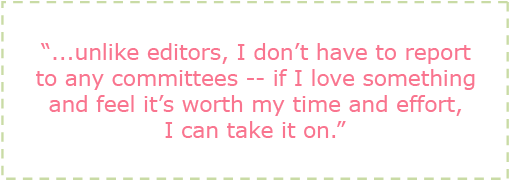
WOW: That's good to know! So then after your stint as an assistant, you were promoted to managing editor, where you often sent out memos that were decorated with a Sheriff's badge. (Great idea, by the way!) It sounds like the position requires a great deal of authority. What are the responsibilities of a managing editor?
Betsy: The position is decidedly less glamorous than it sounds! I was the imprint's traffic cop, making sure that everyone's manuscripts and covers and jacket copy moved as smoothly as possible through production. It was a way for me to move up the ladder quickly, but the part of my job that meant the most to me was acquiring projects and working with writers.
WOW: And now you get to do just that! Yet, back then when you were still climbing the ladder, you worked as an editorial director for Globe Pequot, a small press located in a barn in rural Connecticut, is that correct? It's hard to imagine an editorial director working in a barn! I picture stalls with horses and cows being milked. Can you tell us what your experience was like working there?
Betsy: At the time Globe Pequot was located in Chester, Connecticut, a very scenic Connecticut River town. The barn had been converted to offices long before I got there.
 Working there showed me a different part of the industry. Globe is considerably larger now, but at the time it was a fairly small company with a publishing model that was very different from Random House's. I had to be far more entrepreneurial to acquire books for the list, and that stood me in good stead when I became an agent. Working there showed me a different part of the industry. Globe is considerably larger now, but at the time it was a fairly small company with a publishing model that was very different from Random House's. I had to be far more entrepreneurial to acquire books for the list, and that stood me in good stead when I became an agent.
WOW: That's what I was going to ask you about next; you read my mind! Considering your success, from Vintage to Globe Pequot, why did you decide to become an agent and open the Betsy Amster Literary Enterprises?
Betsy: What's attractive about being an agent is that you're at the very front end of the process, when critical decisions are still being made. I often help writers figure out how to organize their books or tell a story more effectively. And unlike editors, I don't have to report to any committees—if I love something and feel it's worth my time and effort, I can take it on. I can also expand fairly easily into new categories. For example, I'm determined to do a book on China—I've been obsessed with the country ever since my husband and I traveled there in May. I'd love to find the next Peter Hessler (who writes narrative nonfiction for The New Yorker ) or Lan Samantha Chang (who writes literary fiction and is the new head of the Iowa Writers' Workshop) or Qiu Xiaolong (who writes the most wonderful mysteries set in Shanghai). And I will!
WOW: I don't doubt that! Besides your current obsession with China, what subjects do you like to agent?
Betsy: I like literary fiction, quirky and distinctive mysteries, upscale commercial women's fiction, narrative nonfiction (especially books by journalists), popular culture, history and biography, social issues, research-based psychology, self-help, "soft reference," health, gift books, and parenting.
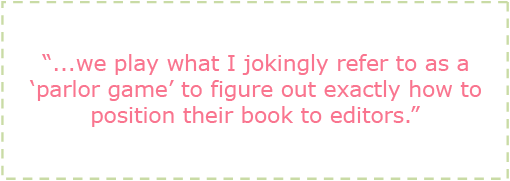
WOW: I listened to a podcast you did with Barbara DeMarco-Barrett, where you talked about your interest in gift books. Why is this market appealing to you?
Betsy: It's partly the market that's appealing to me (it's always useful for a book to HAVE a market—the specific audience for a book is sometimes harder to pinpoint than you might think) but also the people involved. I developed a deep respect for designers and illustrators when I was managing editor at Vintage and Pantheon because I dealt so often with the production and design departments. Visual people are really clever.
WOW: Coming from a visual background, I'd have to agree with you. (wink)
 So, let's say an unsolicited writer wanted to pitch to you, how would they do that? So, let's say an unsolicited writer wanted to pitch to you, how would they do that?
Betsy: The first step is to research me on Publishers Marketplace and make sure that I handle the type of work you're trying to sell. I like to receive the first 3 pages of a novel and a proposal for nonfiction. Please include a letter-size SASE for a response if you're submitting on paper; if you contact us by e-mail, you won't hear back unless we're interested in your work.
WOW: After you decide to take on an author, what happens next?
Betsy: I work with them on readying their material to be submitted. Once it's ready to go out, we play what I jokingly refer to as a "parlor game" to figure out exactly how to position their book to editors. Deciding which successful authors you want to compare yourself to is at the heart of the game—publishers really depend on these "comps" to get a book across to the reps and the bookstores.
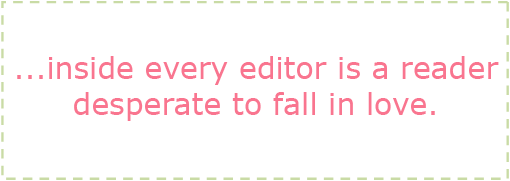
WOW: I've heard that comparing yourself to a successful author can be very helpful in selling your book to an editor, but it can also be detrimental if it's not done right. How do you go about comparing a client's book successfully?
Betsy: There's an art to it. The comparison must be apt. You're not trying to hype the editor (forget any comparisons to Steven King or Dan Brown!), you're trying to intrigue her. I like to have a little fun with it. When I was selling Robin Chotzinoff's memoir, HOLY UNEXPECTED (PublicAffairs), I was able to position her by citing reviews of her previous books: "The L.A. Times has compared Chotzinoff to Dave Barry, while the New Yorker has suggested she be shelved next to Bridget Jones. Another way to think of her is as a Jewish Annie LaMott." It's a very entertaining form of name-dropping. The reason I call it a parlor game is that authors—especially first-time authors—usually have to get over their reluctance to compare themselves to well known writers. But that's how the game is played.
WOW: That's great! I wouldn't be surprised if you just coined a new phrase. Now I'll have to play the Betsy Amster Parlor Game when my novel comes out!
 When it comes to novels, I know that you tend to lean towards literary fiction, which is the genre I most love to read. What is the current climate for literary fiction in the marketplace? When it comes to novels, I know that you tend to lean towards literary fiction, which is the genre I most love to read. What is the current climate for literary fiction in the marketplace?
Betsy: Literary fiction can be harder to sell at the bookstore level than any of us would like. The good news is that inside every editor is a reader desperate to fall in love. My job is to make them do just that.
WOW: When you read a manuscript, does it take more than good writing for you to take it on as an agent?
Betsy: With fiction it's absolutely essential for me to fall in love with the writing. But the plot also needs to work. "Quiet" novels, where the texture of the writing overshadows the plot, have become very hard to place, unfortunately.
With nonfiction, the author's platform is a critical ingredient. Your platform consists of your professional credentials and also your visibility—in other words, the extent to which you're known before you even approach the publisher.
WOW: You're absolutely right. Many first-time authors spend all their time writing their book and less time promoting their book. Possibly because they don't have a clue where to begin. What would you recommend an author do to promote her book?
Betsy: One of the best things you can do is speak in front of groups where you can sell your book. One of my most successful authors—Wendy Mogel, author of THE BLESSING OF A SKINNED KNEE (Penguin)—speaks in front of huge groups of parents and educators all across the country. Generally, a number of schools band together to bring her to town, and then she enlists a local bookstore to sell books at the event. Her book has caught on to the extent that "Blessing of a Skinned Knee" study groups have sprung up across the country. A writer for Slate, Emily Bazelon, caught wind of Wendy's popularity and recently profiled her for The New York Times Magazine. A month after it came out, the article is still the most e-mailed article on newyorktimes.com. As you can imagine, this has helped book sales enormously.
 It also helps when you can take advantage of an existing infrastructure. My client Ruthie Ellenson, editor of THE MODERN JEWISH GIRL'S GUIDE TO GUILT (Dutton), a very funny anthology of pieces by well known Jewish women writers, is spending the next few months speaking at more than 20 Jewish Book Fairs around the country. She's unstoppable! It also helps when you can take advantage of an existing infrastructure. My client Ruthie Ellenson, editor of THE MODERN JEWISH GIRL'S GUIDE TO GUILT (Dutton), a very funny anthology of pieces by well known Jewish women writers, is spending the next few months speaking at more than 20 Jewish Book Fairs around the country. She's unstoppable!
 Writing a newsletter is another helpful way to create a community of readers interested in your work. My client Elaine Aron, author of THE HIGHLY SENSITIVE PERSON and THE HIGHLY SENSITIVE CHILD (both Broadway), has done that very successfully with her newsletter "The Comfort Zone." Or you can establish an on-line community. My author Sandi Ault, whose debut mystery WILD INDIGO Berkley Prime Crime is publishing with great fanfare in January, will be blogging on Amazon, for example. She's also been cultivating a personal relationship with small independent bookstores who often don't get a lot of face time with the regional sales reps. Writing a newsletter is another helpful way to create a community of readers interested in your work. My client Elaine Aron, author of THE HIGHLY SENSITIVE PERSON and THE HIGHLY SENSITIVE CHILD (both Broadway), has done that very successfully with her newsletter "The Comfort Zone." Or you can establish an on-line community. My author Sandi Ault, whose debut mystery WILD INDIGO Berkley Prime Crime is publishing with great fanfare in January, will be blogging on Amazon, for example. She's also been cultivating a personal relationship with small independent bookstores who often don't get a lot of face time with the regional sales reps.
 Having a website is another way to reach out to readers. Maria Amparo Escandon, author of ESPERANZA'S BOX OF SAINTS (Scribner) and GONZALEZ & DAUGHTER TRUCKING CO. (Crown), has a gorgeous one, as does Christopher Noxon, author of REJUVENILE: KICKBALL, CARTOONS, CUPCAKES & THE REINVENTION OF THE AMERICAN GROWN-UP (Crown). You can provide downloadable photos of yourself, reviews of your book, your clips if you have any, and much more that fans and journalists covering you might find interesting. Having a website is another way to reach out to readers. Maria Amparo Escandon, author of ESPERANZA'S BOX OF SAINTS (Scribner) and GONZALEZ & DAUGHTER TRUCKING CO. (Crown), has a gorgeous one, as does Christopher Noxon, author of REJUVENILE: KICKBALL, CARTOONS, CUPCAKES & THE REINVENTION OF THE AMERICAN GROWN-UP (Crown). You can provide downloadable photos of yourself, reviews of your book, your clips if you have any, and much more that fans and journalists covering you might find interesting.
 Some authors create short videos about their books. One of the best sites to see these is vidlit.com. Or check out Book Trailerpark, a new blog on book videos sponsored by Nielsen BookScan (the company that tracks book sales). What publishers and authors are hoping for is something that becomes "viral"—that spreads like wildfire on the web. Some authors create short videos about their books. One of the best sites to see these is vidlit.com. Or check out Book Trailerpark, a new blog on book videos sponsored by Nielsen BookScan (the company that tracks book sales). What publishers and authors are hoping for is something that becomes "viral"—that spreads like wildfire on the web.
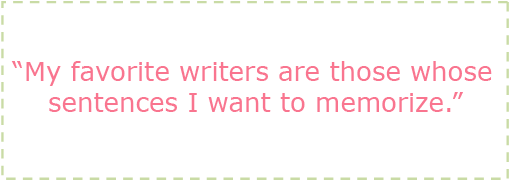
WOW: Betsy, that's some great advice. I'll have to check out the short videos... I've never heard of that one! Besides what an author does to promote herself, how can she gain the support of the publishing house or publicist from the outset?
Betsy: Educating yourself about the process in advance is key—it allows you to speak their language. Being realistic also helps. Usually this means understanding that the editor and the publicist are spread very thin.
WOW: How about independent bookstores? What role do they play in the promotion of an author's new book?
Betsy: The feeling is that independent bookstores are better than the chains at establishing word of mouth. I recently read somewhere that more independent booksellers are going into business these days than have for some time. I hope this is a genuine trend.
 The dominance of the chains is very worrying unless you're one of the few writers they're featuring on one of their front tables, in which case you're likely to be very grateful for their ability to bring your book to the attention of their customers in a big way. The dominance of the chains is very worrying unless you're one of the few writers they're featuring on one of their front tables, in which case you're likely to be very grateful for their ability to bring your book to the attention of their customers in a big way.
WOW: What about a reps' pick? What exactly does that mean?
Betsy: A reps' pick is the reps' favorite book, one they're really pushing in a given season. My client Phil Doran's THE RELUCTANT TUSCAN: HOW I DISCOVERED MY INNER ITALIAN was a reps' pick for Gotham, a division of Penguin USA. It was also a Book Sense Pick, which means it was featured in independent bookstores. This does a lot for sales.
WOW: It sounds like the rep fell in love Phil's book. w
What makes you fall in love with a book?
Betsy: When it comes to fiction, I want to be dazzled, not only by the plot and the characterization, but also by individual sentences. My favorite writers are those whose sentences I want to memorize.
 When it comes to nonfiction, I'm looking for a smart title, a smart concept, and the right platform. With narrative nonfiction—in other words, nonfiction with a story line—the quality of the writing is also very important. When it comes to nonfiction, I'm looking for a smart title, a smart concept, and the right platform. With narrative nonfiction—in other words, nonfiction with a story line—the quality of the writing is also very important.
WOW: What if the writing needs some work? How much editing do you do to an author's manuscript?
Betsy: It depends. The process of writing fiction and narrative nonfiction is very messy. The only cure is numerous drafts, most of which writers undertake on their own.
 The writers I take on generally come to me with their material quite far along, but sometimes it's helpful for me to line edit or do conceptual editing to deal with issues of plot and pacing. I always hesitate to admit that in print, though, because I worry that it encourages writers to approach me earlier in the process than they should. The kind of editing I like to do, whether it's micro or macro, is actually very easy—it's not what I call "scrubbing" a manuscript, which is more properly the author's realm. When Kurt Andersen recently interviewed my client Steven Carter on NPR's Studio 360, for example, Steve admitted that he had gone over his new novel FAMOUS WRITERS SCHOOL (Counterpoint) some 50 times on his own. That's a client you've got to love—a perfectionist! The writers I take on generally come to me with their material quite far along, but sometimes it's helpful for me to line edit or do conceptual editing to deal with issues of plot and pacing. I always hesitate to admit that in print, though, because I worry that it encourages writers to approach me earlier in the process than they should. The kind of editing I like to do, whether it's micro or macro, is actually very easy—it's not what I call "scrubbing" a manuscript, which is more properly the author's realm. When Kurt Andersen recently interviewed my client Steven Carter on NPR's Studio 360, for example, Steve admitted that he had gone over his new novel FAMOUS WRITERS SCHOOL (Counterpoint) some 50 times on his own. That's a client you've got to love—a perfectionist!
 If a promising novel requires major surgery, I usually suggest that the author work with an experienced book doctor. There are some very fine ones out there who can make all the difference. If a promising novel requires major surgery, I usually suggest that the author work with an experienced book doctor. There are some very fine ones out there who can make all the difference.
WOW: Is there such a thing as a "polished" manuscript?
Betsy: I should hope so! I get the sense that a lot of my writers choose every word with care. I love that attention to detail.
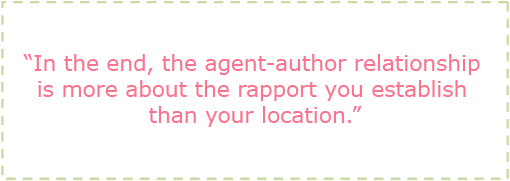
WOW: As many writers know, practically all the literary agents are located in New York, yet Betsy Amster Literary Enterprises is located in Los Angeles. I'm sure you get this a lot, but why L.A.? Is there an advantage that New York doesn't know about?
Betsy: As I'm fond of saying on panels, I like my long leash. To put it another way, it gives me a certain advantage to be "outside the beltway," both in terms of finding authors and also in being open to new ideas. I'm not referring to new age ideas here—I don't happen to handle that kind of work. What I'm interested in is the West's ethnic complexity, the region's complex history, and the fact that we're on the Pacific Rim.
 That said, I have clients all over the country, including New York. In the end, the agent-author relationship is more about the rapport you establish than your location. That said, I have clients all over the country, including New York. In the end, the agent-author relationship is more about the rapport you establish than your location.
WOW: What advice do you have for aspiring authors?
Betsy: Read as much as you can about the publishing industry. Susan Page's THE SHORTEST DISTANCE BETWEEN YOU AND A PUBLISHED BOOK is a good start. Also, it pays to join a writers' group whose feedback you trust. Writing in isolation is not a good idea.
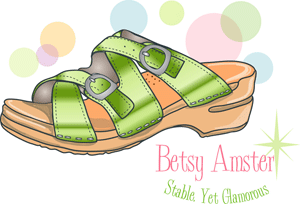 WOW: Since this issue is called, "Walking in an Agent's Shoes," what is your favorite pair of shoes? And what is it like to walk in them? WOW: Since this issue is called, "Walking in an Agent's Shoes," what is your favorite pair of shoes? And what is it like to walk in them?
Betsy: Chunky Dansko sandals. Very stable yet just a little bit glam.
WOW: Thank you Betsy for making this such a fun interview! Your wisdom has given me a clearer picture of what being a literary agent is all about, and your insight on book promotion is inspiring! And now I too, am desperate to fall in love with my next book.
***
Betsy Amster Literary Enterprises
https://amsterlit.com
|